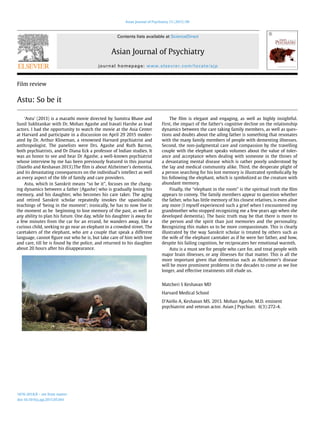
Keshavan on astu in asian journal
- 1. 1876-2018/$ – see front matter doi:10.1016/j.ajp.2015.05.041 Asian Journal of Psychiatry 15 (2015) 90 Contents lists available at ScienceDirect Asian Journal of Psychiatry journal homepage: www.elsevier.com/locate/ajp Film review Astu: So be it ‘Astu’ (2013) is a marathi movie directed by Sumitra Bhave and Sunil Sukhtankar with Dr. Mohan Agashe and Iravati Harshe as lead actors. I had the opportunity to watch the movie at the Asia Center at Harvard and participate in a discussion on April 29 2015 moder- ated by Dr. Arthur Klineman, a renowned Harvard psychiatrist and anthropologist. The panelists were Drs. Agashe and Ruth Barron, both psychiatrists, and Dr Diana Eck a professor of Indian studies. It was an honor to see and hear Dr Agashe, a well-known psychiatrist whose interview by me has been previously featured in this journal (Daiello and Keshavan 2013).The film is about Alzheimer’s dementia, and its devastating consequences on the individual’s intellect as well as every aspect of the life of family and care providers. Astu, which in Sanskrit means “so be it”, focuses on the chang- ing dynamics between a father (Agashe) who is gradually losing his memory, and his daughter, who becomes his care taker. The aging and retired Sanskrit scholar repeatedly invokes the upanishadic teachings of ‘being in the moment’; ironically, he has to now live in the moment as he beginning to lose memory of the past, as well as any ability to plan his future. One day, while his daughter is away for a few minutes from the car for an errand, he wanders away, like a curious child, seeking to go near an elephant in a crowded street. The caretakers of the elephant, who are a couple that speak a different language, cannot figure out who he is, but take care of him with love and care, till he is found by the police, and returned to his daughter about 20 hours after his disappearance. The film is elegant and engaging, as well as highly insightful. First, the impact of the father’s cognitive decline on the relationship dynamics between the care taking family members, as well as ques- tions and doubts about the ailing father is something that resonates with the many family members of people with dementing illnesses. Second, the non-judgmental care and compassion by the travelling couple with the elephant speaks volumes about the value of toler- ance and acceptance when dealing with someone in the throes of a devastating mental disease which is rather poorly understood by the lay and medical community alike. Third, the desperate plight of a person searching for his lost memory is illustrated symbolically by his following the elephant, which is symbolized as the creature with abundant memory. Finally, the “elephant in the room” is the spiritual truth the film appears to convey. The family members appear to question whether the father, who has little memory of his closest relatives, is even alive any more (I myself experienced such a grief when I encountered my grandmother who stopped recognizing me a few years ago when she developed dementia). The basic truth may be that there is more to the person and the spirit than just memories and the personality. Recognizing this makes us to be more compassionate. This is clearly illustrated by the way Sanskrit scholar is treated by others such as the wife of the elephant caretaker as if he were her father, and how, despite his failing cognition, he reciprocates her emotional warmth. Astu is a must see for people who care for, and treat people with major brain illnesses, or any illnesses for that matter. This is all the more important given that dementias such as Alzheimer’s disease will be more prominent problems in the decades to come as we live longer, and effective treatments still elude us. Matcheri S Keshavan MD Harvard Medical School D’Aiello A, Keshavan MS. 2013. Mohan Agashe, M.D. eminent psychiatrist and veteran actor. Asian J Psychiatr. 6(3):272-4.